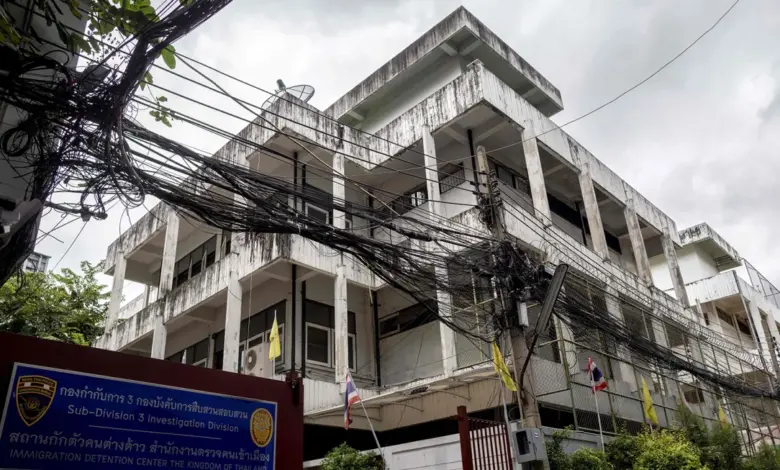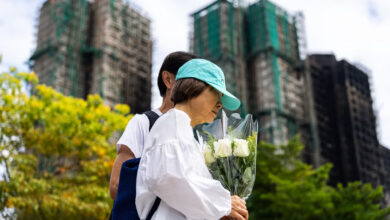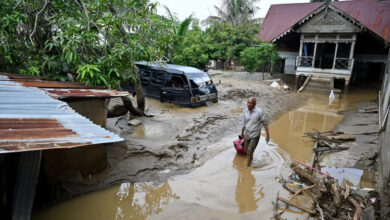
United Nations experts on Tuesday urged Thailand to “immediately halt the possible transfer,” warning the men were at “real risk of torture or other cruel, inhuman or degrading treatment or punishment if they are returned.”
Concerns for the 48 men, who have been detained in Bangkok since 2014, are growing after a Uyghur activist shared a voice note from one of the detainees, who said the men had been on hunger strike since January 10 in a desperate protest against deportation.
Arslan Hidayat, an activist working with Justice for All’s Save Uyghur campaign, told CNN he understands the men remained on hunger strike as of Tuesday.
“We are desperately seeking help from those living in the free world,” the detainee said in a voice note that Hidayat published to Instagram. “You all know what will happen to us if we are sent back to China. This is our plea for help from your 48 brothers in Thailand.”
The 48 men were arrested by Thai authorities 11 years ago after crossing the border to Thailand in an attempt to escape persecution in China. They were part of a larger group of about 350 people detained at the time, some of whom were minors, according to previous reports from UN experts, rights groups, and Uyghur campaigners.
Five Uyghur detainees, including a newborn and a 3-year-old, have died in detention, the reports said.
Human rights groups and campaigners say that in the years since, the men have been held in “in life-threatening conditions” without access to lawyers, family members or UN representatives. Human Rights Watch said the men were living in “squalid conditions with poor hygiene and inadequate medical care.”
“We are informed that 23 of the 48 individuals suffer from serious health conditions, including diabetes, kidney dysfunction, paralysis of the lower body, skin diseases, gastrointestinal illnesses, and heart and lung conditions,” the eight UN experts said Tuesday. They include the UN special rapporteurs on torture and on migrants’ human rights, and other independent human rights experts appointed by the UN Human Rights Council.
“It is essential they be provided with the necessary and appropriate medical care,” the UN experts added.
Fears the 48 would be imminently transferred to Chinese custody arose on January 8 when Thai authorities reportedly gave the detainees “voluntary return” documents to sign, according to the Save Uyghur campaign. Detainees told the group their photos were taken and reported an increase in threats of deportation from officials in the immigration detention center.
Thai officials have denied plans to deport the Uyghurs, according to local media. CNN has reached out to Thai police and the country’s defense minister for comment.
China’s Ministry of Foreign Affairs said Wednesday: “The matter involves judicial cooperation between two sovereign states.”
UN experts should abide by the principle of the UN charter and “refrain from interfering with the judicial sovereignty of the member states … rather than making irresponsible remarks,” ministry spokesperson Mao Ning said at a regular press briefing.
Long persecuted minority
The predominately Muslim Uyghurs are a distinct ethnic minority from Xinjiang, a massive, nominally autonomous region in the far west of China.
China’s repression of Uyghurs and other ethnic minorities in Xinjiang has been labeled “genocide” by the US and other countries, with widespread and credible reports of arbitrary detention, mass surveillance, forced labor and restrictions on movement – allegations China vehemently denies.
A landmark 2022 report from the UN’s high commissioner for human rights said China had committed “serious human rights violations” against the Uyghurs, documenting what it described as arbitrary and discriminatory detention of members of Uyghur and other predominately Muslim groups.
At the time, more than 1 million Uyghur and other Muslim minority peoples were estimated to be held in extrajudicial camps for “re-education” and indoctrination. Descriptions of detentions “were marked by patterns of torture or other forms of cruel, inhuman or degrading treatment or punishment,” the UN report found.
China has fiercely denied committing rights violations. It has previously said it established such centers to counter “extremism” in the region, and has since said the facilities were closed.
A letter from the 48 detainees dated January 10 said: “We urgently appeal to all international organizations and countries concerned with human rights to intervene immediately to save us from this tragic fate before it is too late.”
Human Rights Watch said they face “risks of enforced disappearance, long-term imprisonment, torture, and other severe mistreatment,” if they are forcibly repatriated.
Pressure on Thailand
Among the prominent voices adding pressure on Thailand was US Secretary of State Marco Rubio, who told his Senate confirmation hearing ahead of being sworn in Tuesday that he would lobby Bangkok against deporting the Uyghur men.
“Thailand is actually a very strong US partner, strong historical ally as well,” Rubio said. “That is an area where I think diplomacy could really achieve results because of how important that relationship (is) and how close it is.”
Meanwhile, John Moolenarr, chairman of the House Select Committee on China, wrote a letter to Thailand’s Ambassador to the US last week expressing his alarm over the reports and urged the government to release the men to a third country.
The UN experts also called on Thailand, which is a member of the UN Human Rights Council, to respect its obligations under international law.
“The prohibition on refoulement prohibits the return or transfer in any manner whatsoever to a country where there is real risk of torture or other cruel, inhuman or degrading treatment or punishment,” they said.
The Southeast Asian kingdom is not a party to the 1951 Refugee Convention and does not recognize the concept of asylum. Thailand has a history of pushing refugees back across its borders and of deporting dissidents.
In 2015, Thailand deported 100 Uyghurs to China, sparking international outcry. The fate and whereabouts of those returned are unknown, UN experts said last year.
In the same move, more than 170 Uyghur women and children were voluntarily transferred to Turkey. Many families were separated, including those of the men still in detention in Thailand.
“We call for a prompt, effective investigation, and assessment of all the circumstances of the arrest and continued deprivation of liberty of this group of persons,” the UN experts said Tuesday.
CNN’s Kocha Olarn contributed to this report from Bangkok, Thailand.




